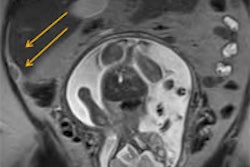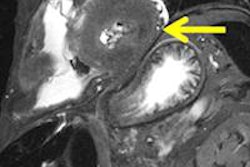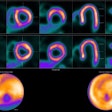Cryoablation of metastatic lung tumors up to 3.5 cm in size appears to be an effective treatment, according to early results of a multicenter clinical trial presented at last week's Society of Interventional Radiology (SIR) annual meeting.
Dr. David Woodrum, PhD, an interventional radiologist at the Mayo Clinic in Rochester, MN, reported three-month results from 22 patients enrolled in the Evaluating Cryoablation of Metastatic Lung/Pleura Tumors in Patients: Safety and Efficacy (ECLIPSE) trial. Among the 22 patients, 36 tumors were treated in 27 cryoablation procedures.
The group consisted of 13 men and nine women whose pulmonary metastatic disease was predominantly caused by colon cancer (41%) and renal cancer (18%). Fifteen patients had one tumor, five patients had two or three tumors, and two patients had more than three tumors. The tumors ranged in size from 0.7 cm to 3.2 cm.
At a median follow-up of three months, all patients had maintained local tumor control; however, six patients were diagnosed with new distant tumors. At the six-month milestone, five patients still had no recurrence of the original tumor.
Cryoablation uses a CT-guided probe in which the tip is cooled with gas to as low as -100° C to freeze metastatic tumors. The resulting halo of ice crystals can destroy cancer by interrupting its cellular function, but the procedure protects adjacent healthy lung tissue.
The cryoablation procedures took 45 minutes to almost three hours in the study, with one to six probes used per patient. In addition to the Mayo Clinic, patients were treated at the University of California, Los Angeles Medical Center; the Karmanos Cancer Institute in Detroit; and the Institut de Cancérologie Gustav Roussy in Villejuif, France. Most patients were discharged the day after the procedure.
All adverse events were considered grade 1 or 2. Seven patients developed a pulmonary embolism, four developed pneumothorax, and five experienced chest wall pain. All of these conditions resolved with minimal or no intervention.
"Cryoablation has potential as a treatment for cancer that has spread to the lungs from other parts of the body, and could prolong the lives of patients who are running out of options," Woodrum said in a statement. "We may not be able to cure the cancer, but with cryoablation we can at least slow it down significantly and allow patients to enjoy greater quality of life longer."



















